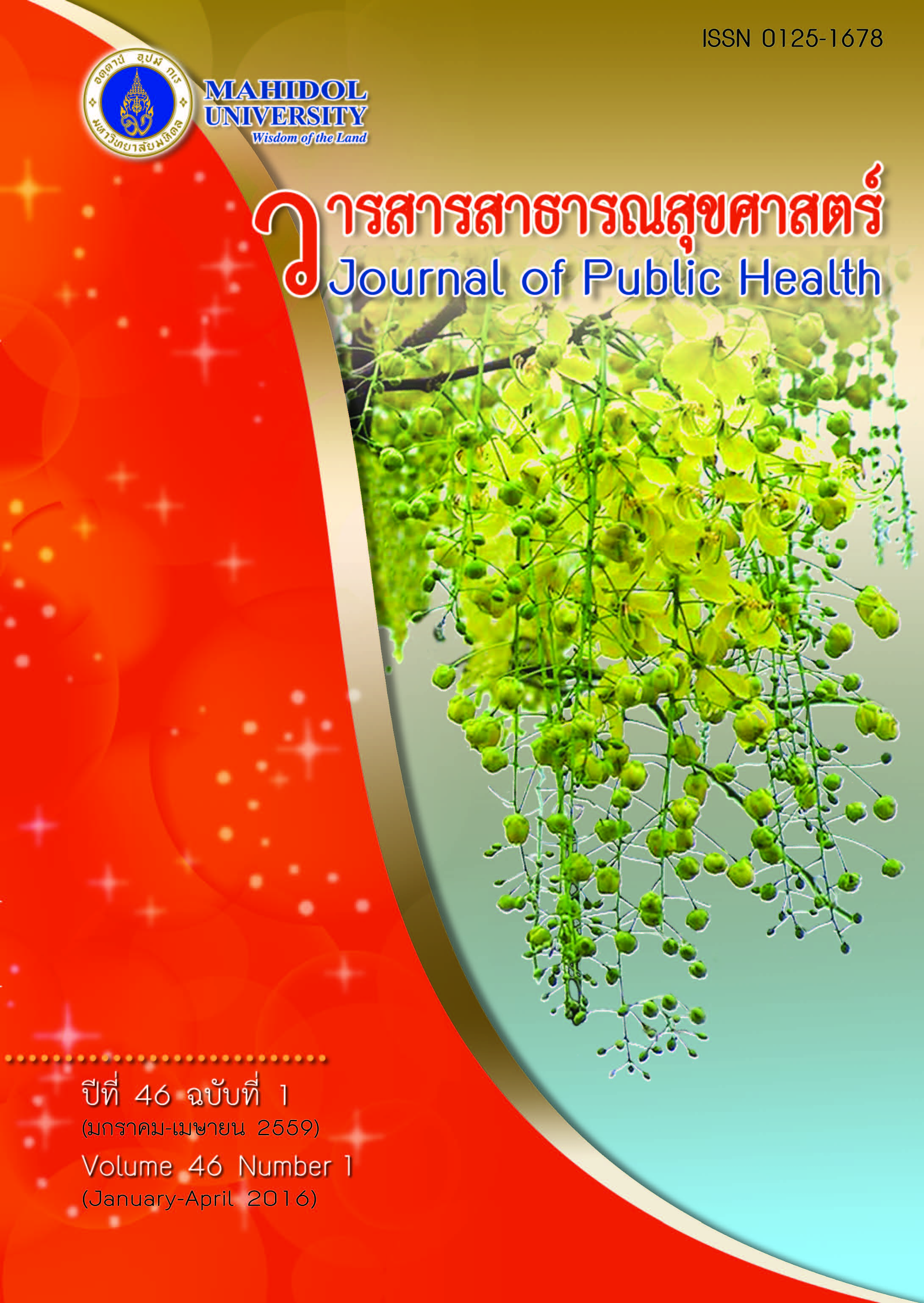ความชุกและความสัมพันธ์ระหว่างการทำกิจกรรมกับภาวะบกพร่องทางปัญญาในผู้สูงอายุ
Keywords:
ความชุก, ภาวะบกพร่องทางปัญญา, ภาวะสมองเสื่อม, การมีกิจกรรมทางกาย, การมีกิจกรรมร่วมกับสังคม, prevalence, cognitive impairment, dementia, physical activity, social activityAbstract
บทคัดย่อ
การศึกษาครั้งนี้เป็นการศึกษาภาคตัดขวาง มีวัตถุประสงค์เพื่อศึกษาความชุกและความสัมพันธ์ระหว่างการทำกิจกรรมกับภาวะบกพร่องทางปัญญาในผู้สูงอายุ ประชากรที่ศึกษาคือ ผู้สูงอายุที่อาศัยอยู่ในจังหวัดกาฬสินธุ์ที่มีอายุ 60 ปีขึ้นไป จำนวน 460 คน ได้จากการสุ่มตัวอย่างแบบแบ่งชั้นภูมิสองขั้นตอน คือ ตามพื้นที่และช่วงอายุ เครื่องมือที่ใช้คัดกรองภาวะบกพร่องทางปัญญา คือแบบทดสอบสมรรถภาพสมองเบื้องต้นฉบับภาษาไทย พ.ศ. 2545 (MMSE-Thai 2002) วิเคราะห์ข้อมูลโดยใช้ Logistic Regression หาความสัมพันธ์ระหว่างการทำกิจกรรมกับภาวะบกพร่องทางปัญญา ผลการศึกษา พบความชุกของภาวะบกพร่องทางปัญญา ร้อยละ 18.5 เมื่อควบคุมตัวแปรกวนต่างๆแล้ว พบว่า ผู้สูงอายุที่มีอายุตั้งแต่ 80 ปีขึ้นไป (ORadj = 3.39, 95% CI: 1.16-9.92) การมีกิจกรรมทางกาย (ORadj = 0.35, 95% CI: 0.15-0.80) และการเข้าร่วมกิจกรรมทางสังคมสม่ำเสมอ (ORadj = 0.39, 95% CI: 0.22-0.69) มีความสัมพันธ์กับภาวะบกพร่องทางปัญญา ข้อเสนอแนะจากการศึกษาคือ หน่วยงานที่เกี่ยวข้องควรมีการจัดระบบเฝ้าระวังภาวะบกพร่องทางปัญญาในผู้สูงอายุ เช่น การคัดกรอง และควรส่งเสริมการจัดกิจกรรมทางกาย เช่น การเดิน การปั่นจักรยาน และมีกิจกรรมทางสังคมสำหรับผู้สูงอายุในชุมชน เช่น กิจกรรมชมรม งานประเพณี กิจกรรมอาสาสมัครช่วยเหลือในงานต่างๆ ซึ่งกิจกรรมเหล่านี้จะช่วยลดความเสี่ยงต่อการเกิดภาวะบกพร่องทางปัญญาในผู้สูงอายุ
Prevalence and Association Between Activities and Cognitive Impairment among the Elderly
ABSTRACT
This cross-sectional study aimed to determine prevalence and association between activities and cognitive impairment among the elderly. The study included 460 subjects 60 years old and above living in Kalasin Province. Stratified two-stage random sampling by area and age was used to select the subjects. Cognitive impairment status was screened by MMSE-Thai 2002. Logistic regression was used to assess the association between activities and cognitive impairment. The results revealed that the prevalence of cognitive impairment among the elderly was 18.5%. After controlling confounding variables, factors found to be associated with cognitive impairment included age 80 years or above (ORadj = 3.39, 95% CI: 1.16-9.92), having physical activity (ORadj = 0.35, 95% CI: 0.15-0.80) and regular social activity (ORadj = 0.39, 95% CI: 0.22-0.69). The authorities should establish a surveillance system for cognitive impairment among the elderly such as appropriate screening tools. Furthermore, physical activities, like walking or bicycling, and social activities such as club, group, traditional or volunteer activities should be well prepared for the elderly. These activities can help them in reducing the risk of cognitive impairment.
Downloads
Published
Issue
Section
License
Creative Commons License CC-BY-ND


